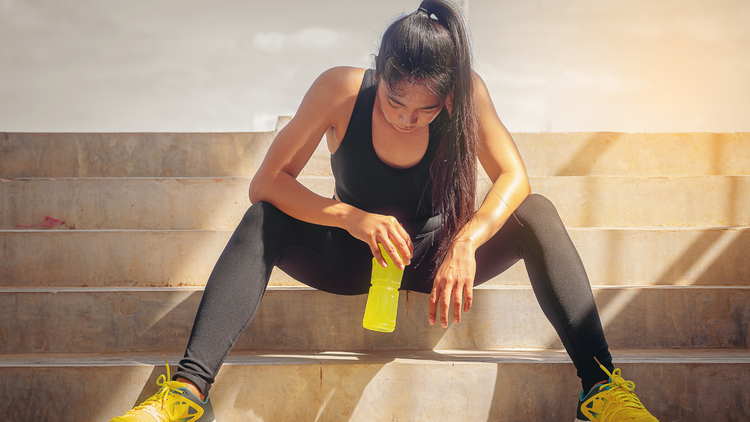February 22, 2022

Electrolytes: How Many Do You Actually Need?
#DidYouKnow – nearly 60% of the human body is made up of water. Considering the way our bodies need, use and lose water constantly…like when we chase the kiddo after they pull their diaper off and run around the front yard… just us?
Anyway, it’s only natural that staying hydrated be an important part of our daily routine.
Another important part of keeping your body balanced and healthy? Electrolytes.
Electrolytes are electrically charged minerals that help your body regulate chemical reactions. These reactions help keep your fluid levels balanced so you stay hydrated.
Electrolytes maintain the acidity (pH) level of your blood and regulate blood pressure. They also help ensure good muscle contraction so your muscles function the way they should. You fuel your body with electrolytes through the foods and liquids you consume.
There are several important electrolytes that work inside your body. These include:
- Sodium – helps your body hold on to fluid to keep an appropriate balance. This enables your cells to absorb the appropriate amount of nutrients.
- Magnesium – helps your cells create energy through the nutrients they are receiving. Magnesium is also important for your brain and muscles to function properly.
- Potassium – works alongside sodium and is important for good heart function.
- Calcium – helps build and maintain strong bones. It also contributes to proper muscle function.
- Chloride – another helper for balancing fluid inside of the body. Calcium also helps maintain the body’s pH balance.
- Phosphate – helps your cells break down and metabolize nutrients. This contributes to the amount of energy that your body is able to create.
- Bicarbonate – an element that helps regulate pH levels in the blood.
Have you ever been watching a sports game to see a player suddenly collapse with leg cramps? Athletes lose a lot of fluid during their events. Cramps are usually because of an electrolyte imbalance and dehydration.
Most often, we lose fluid and electrolytes through intense activity and sweating. We also lose electrolytes through urine or excessive fluid loss when we are sick or not feeling well. When we lose a lot of sodium or other minerals, we may also experience dehydration.

How do you know if you’re dehydrated? The first and most noticeable sign is feeling thirsty. Other signs and symptoms of dehydration include:
~ dry mouth
~ headaches
~ dizziness
~ fatigue
~ brain fog
~ dark urine
~ elevated heart rate
The number of electrolytes lost per day depends on a variety of factors. Some of these factors include a person’s weight and activity level. It is also influenced by the duration and intensity of activity, humidity, and sweat loss.
Sodium gets a bad rap sometimes, but it isn’t bad for our bodies generally. Keep in mind how sodium helps. Our bodies need sodium to help regulate certain functions and maintain homeostasis. (Homeostasis is a dynamic physiological process of internal balance. In this state, our bodies can maintain important things like temperature and blood pressure through changing external factors.) When we sweat, sodium is the main electrolyte we lose.
So then is it necessary to replace sodium or other electrolytes through supplements?
For the average person, consuming a well-rounded diet of whole foods is all you need. This will restore electrolyte levels to meet the daily recommended amount. Bicarbonate is produced in the body, but we otherwise replenish electrolytes our diet. It’s important to get plenty of fruits and vegetables and healthy fats from nuts and seeds.
Let’s take a closer look at sodium…
The recommended amount of sodium varies depending on which health expert you talk to. It’s also based on individual needs. According to the 2015-2020 Dietary Guidelines for Americans, a person should consume no more than 2,300 mg of sodium per day. This is equal to roughly one teaspoon of table salt.
Many Americans get a lot more sodium than they actually need. This is especially true because of the increased consumption of processed foods. So for the average person, it’s not necessary to replace sodium in the diet through an electrolyte supplement.
Here’s a general rule of thumb for electrolyte supplementation…
The average person is either sedentary or participates in light to moderate exercise. These people will likely get enough of their lost electrolytes through eating a balanced diet. The most important thing to consider is proper hydration. Again, water makes up about 60% of our body and thus depends on good ole’ H2O to function its best.
The amount of water consumption recommended for the average adult is nine cups for women and 13 cups for men. One cup is eight ounces.
Pro Tip: It’s also suggested that hydration is easier when water tastes good. (Woah!) A flavor enhancer can help make it easier to drink more water and encourage hydration. Try adding a fruity drink mix! True Lemon Energys are a delicious way to pump up your water. They’re also powered with energy from green tea to help keep you hydrated and going strong through your busy day. (BONUS: they contain ZERO calories and NO artificial sweeteners or flavors!)
So who should aim to get a little extra boost in electrolytes? According to the American College of Sports Medicine, endurance athletes or those who engage in intense exercise or activity for an hour or more could benefit from added electrolytes. A good quality sports drink is another great way to hydrate and replenish lost fluids. (Be sure to read labels and consider the amount of added sugar in botted beverages!)
Also, when exercising in extreme heat or humidity, you may be sweating a little more than usual. The amount of electrolytes needed in this case may be higher. This is another good time to consider extra hydration and added electrolytes.
More on Health and Wellness




